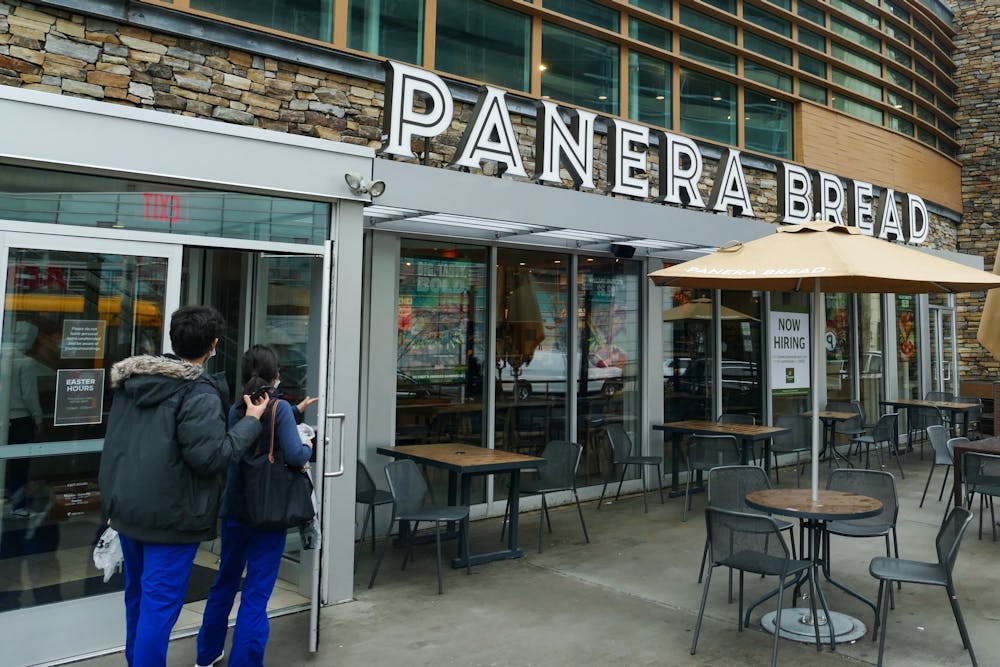While arriving at Penn was a culture shock in many ways, with its emphasis on pre-professionalism and work-hard, play-harder attitude, what I still find myself grappling with is how different my high school experience was from many of my peers. Specifically, I was taken aback by how many Penn students have never worked a job, let alone a customer-service one: a job in food-service and retail.
Personally, like many of my hometown friends, I’ve had a job since sophomore year of high school, first bussing tables at a local Greek restaurant and then working in food preparation at Panera. Of course, like any teenager, I wanted spending money, and, coming from a middle-class family, this meant getting a job. However, working eight hour shifts for minimum-wage reminded me I had a lot to learn about the value of money.
Instead of thinking of the meal I was eating with my friends as $25, I began to see it as over two hours of work. The new shoes I wanted were two full eight-hour shifts (before taxes), and gas was four hours of making sandwiches for grouchy customers at Panera. However, it wasn’t just the time I spent at work that went into my new mental cost-calculator. It was also the mental drain that came with working around blasting ovens, apologizing to screaming customers, cowtowing to over-zealous managers, and babysitting incompetent coworkers. This new outlook on what I gave up every hour for a measly $10 completely revolutionized my understanding of the relationship between money and work, customer and employee, and me and myself.
Moreover, whereas I had once been quite indifferent towards waitresses or cashiers, I now saw beyond the occupation into the person. These were people who were often being paid the bare minimum, working long hours, and being shown little respect. Although it took a dose of personal experience to realize it, it’s an understanding I carry with me throughout each day — and intend to for the rest of my life. But while I was internalizing a working-class ethos every weekend, many of those at Penn have either never tried or failed to do so.
Working a customer-service job is not a prerequisite to life for many at Penn who fall into the highest tax-brackets and upper-echelons of society. Despite that, the lessons and experiences gained from these jobs are necessary and invaluable. And many Penn students who lack such work experience sometimes reflect that deficit in their behavior. The clearest example of this is many of my peers’ attitudes towards the dining hall and other Penn staff. Since the popularization of the new social media app Sidechat, I have seen countless posts complaining about the demeanor and attitudes of Penn staff, often somewhat disrespectfully.
And while Sidechat has served as a new platform for these thoughts, the posts reflect sentiments that have been consistently verbalized during my time here at Penn. As someone who has worked customer-service jobs, this misplaced attitude is indicative of immense privilege, on two fronts. One, to never have had to work a similar job, and two, to not feel the need to approach those who do with a certain level of respect and empathy.
After all, if dining hall workers are putting food on your plate and not being actively — and that's an important distinction — rude to you, what else do you believe they owe you? In reality: nothing. They don’t owe you a smile or a conversation or even a “hello.” They, like much of the Penn non-academic staff, are working long shifts, with little appreciation, largely for a student body they most likely have no socioeconomic connection to. Until Penn students at large understand the realities of working-class life, which include working typically low-paying customer-service jobs, their opinions on this subject are meritless, and rightfully so.
Importantly, in an environment such as Penn, where the average median family income is $195,000 (nearly three times the national average), we must consistently face the fact that our circumstances are not reflective of reality for the vast majority of this country or even the areas directly surrounding our campus. Many working-class Americans hold customer-service jobs as careers, and although most Penn students likely never will do the same, it’s important to show empathy and try to understand those who do.
SEE MORE FROM VINAY KHOSLA:
While I think the best way to do this is for incoming Penn students to take their senior summer to work such a job, I realize that time has long-past for many of us already at Penn. Despite this, having meaningful conversations with your peers from different backgrounds, and with different work experience, than your own can be necessarily enlightening. Even so, I would encourage current Penn students to seek customer-service jobs (which are available in especially great abundance right now) during summer vacation or over breaks. After all, as an institution so oriented towards pre-professionalism, it is crucial for Penn students to understand careers come in more shapes and sizes than the white-collar destinies of most graduates.
VINAY KHOSLA is a College first year studying philosophy and political science from Baltimore, Md. His email is vkhosla@sas.upenn.edu.









